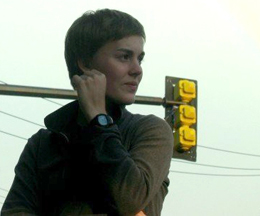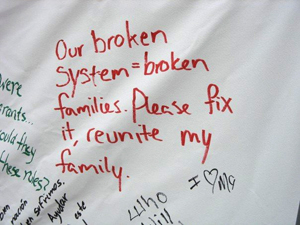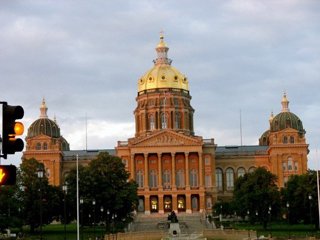United Conference Assembly 2012
by Krista Showalter Ehst, Bally congregation
Now to God who is able to do immeasurably more than all we ask or imagine, according to his power that is at work within us, to him be glory in the church and in Christ Jesus throughout all generations, for ever and ever! Amen.

The passion of Paul himself permeated the auditorium as Ervin Stutzman, Executive Director of Mennonite Church USA, stood from his kneeled position and—hands stretched towards the sky—proclaimed these words from Ephesians 3:20-21. It was a fitting end to his message and an equally fitting end to the United Conference Assembly, in which 175 delegates, credentialed leaders, and other participants gathered to reflect upon and imagine where God has and might be at work amidst Franconia and Eastern District Conferences.
The day-long Assembly provided several opportunities for engaging God’s work through workshops, meal-time fellowship, a large exhibition of agencies, schools, and other ministries, delegate business sessions, and multi-lingual worship. This year’s second united gathering of the conferences was held at Penn View Christian School, Souderton, Pa.
Stutzman reminded participants that Paul wrote this prayer while in prison, a time of great trouble both for the apostle and the churches that looked to him as a leader. It is perhaps during the times of greatest trouble, Stutzman said, that God is working beyond our imagination.

Responses to the recent devastation of Hurricane Sandy testified to the ways God is at work in times of trouble. Andrew Huth, a documentary photographer and associate pastor of Amber congregation, recently traveled to New York City to photograph the aftermath of Sandy. The images he shared revealed immense destruction and heartache, but evidenced God’s love working through Mennonite Disaster Service teams from both conferences, local community members, and residents of the devastated areas. “If we aspire to be the kind of people who, at a moment’s notice, are ready and prepared to do the work of God,” Huth reflected, “then we must come pre-dirty.” The world doesn’t need us to put on a perfect face, Huth added, but they “should know us as followers of Christ from our stench.”
In the Franconia Conference business session, moderator John Goshow (Blooming Glen congregation) and assistant moderator Marta Castillo (Nueva Vida Norristown New Life congregation) acknowledged the challenge of loving one another and remaining in unity—particularly in the midst of disagreement over issues of human sexuality. Recently, the conference board received a letter from the Alpha congregation stating that they have decided to accept into membership persons with a homosexual orientation. The conference board is fully aware of the diversity of perspectives on this issue within Franconia Conference, according to Goshow, and decided that they were unwilling to sever a relationship with the Alpha congregation at this time. “We acknowledge that further discernment on this subject is needed and desire that disagreeing voices be heard non-judgmentally and with patience and respect,” Goshow said. “We believe that God will be at work as we seek further discernment on this important issue.”

The ongoing relationship with Eastern District was another key topic of conversation. Franconia’s executive minister Ertell Whigham and Warren Tyson, Conference Minister of Eastern District, conferred with delegates on their responses to this common work; many delegates affirmed the benefits of working together and sharing resources. There were also some reservations, however, around the risk of the smaller Eastern District being absorbed by the larger Franconia as well as potential theological differences between the two groups.
The desire to share resources speaks to a continued trend of decreased giving to the conference budget. Whigham and Randy Nyce (Salford congregation), Conference Board Financial Committee Chair, alluded to the decreased financial support that Franconia Conference receives and a likely accompanying decrease in staff. This concerned some delegates, especially credentialed leaders who depend upon the support of their LEADership Ministers.
In the midst of these uncertainties, delegates were reminded of the many ways God has been and is at work throughout the conference community. Stutzman challenged the assembly to look for God “at work in every aspect of our lives” and within sessions and around dinner tables, participants shared of laundromat and garden ministries, appreciation dinners for local firefighters, and other creative, hands-on ways of entering into God’s work.

Ripple, an emerging Anabaptist community birthed out of Whitehall congregation, brought particular witness to daily participation in God’s work as they were introduced to delegates and accepted into Franconia Conference as a member congregation. Ripple seeks to respond to needs and possibilities in Allentown by serving their community through food distribution, engaging local children and youth, and living out community with those who have been marginalized.
Overall, the day was a rich one, filled with inspiring witness, tough yet necessary conversation, and much time to connect with persons from across both conferences. In the face of recent storm damage, uncertain economic realities, and the challenging topic of human sexuality, participants were challenged to trust and to take risks out of the knowledge that God can “do immeasurably more than all we ask or imagine, according to his power that is at work within us.”
Watch the highlight video, listen to the podcast, or peruse the photo gallery from Conference Assembly 2012.

 As our rental mini-van approached the Twin Cities, Steve Kriss turned down the radio and raised his voice a few notches so those of us curled up in the back seat could hear. Steve, Jessica Walter, Ale Lopez, Felicia Moore, Sheldon Good, and I had driven for two days, as we kicked-off a week long Midwest road trip. Steve offered a reminder of the purpose of our trip before we pulled into our first official destination. I was surprised when he started talking about the early church, thinking to myself how driving cross-country with our iPods, laptops, and gas station stops related to the early Christian church. But as Steve began telling the story of those early churches that spread quickly and sprang up all over the Roman empire, I felt some of Steve’s excitement and understood his comparisons.
As our rental mini-van approached the Twin Cities, Steve Kriss turned down the radio and raised his voice a few notches so those of us curled up in the back seat could hear. Steve, Jessica Walter, Ale Lopez, Felicia Moore, Sheldon Good, and I had driven for two days, as we kicked-off a week long Midwest road trip. Steve offered a reminder of the purpose of our trip before we pulled into our first official destination. I was surprised when he started talking about the early church, thinking to myself how driving cross-country with our iPods, laptops, and gas station stops related to the early Christian church. But as Steve began telling the story of those early churches that spread quickly and sprang up all over the Roman empire, I felt some of Steve’s excitement and understood his comparisons. These questions were unsettling, to say the least. Throughout my college years, I have come to believe deeply in a God who crosses all boundaries and whose Spirit is active and present in the world; I have found faith in the life, death, and resurrection of Jesus Christ, trusting that he provides salvation from the cycles of violence of our world and enables every one of us to find healing and wholeness amidst our brokenness. I began to wonder: what if these beliefs were only relevant in a community I was at ease in? What happened if faith and salvation only worked and felt right when I was surrounded by people who came from the same place as me, articulated their theology similarly, worshiped in ways I enjoyed and connected with? I always thought I embraced diversity, but what if deep down I wanted everyone to be the same kind of Christian and same kind of Mennonite that I am?
These questions were unsettling, to say the least. Throughout my college years, I have come to believe deeply in a God who crosses all boundaries and whose Spirit is active and present in the world; I have found faith in the life, death, and resurrection of Jesus Christ, trusting that he provides salvation from the cycles of violence of our world and enables every one of us to find healing and wholeness amidst our brokenness. I began to wonder: what if these beliefs were only relevant in a community I was at ease in? What happened if faith and salvation only worked and felt right when I was surrounded by people who came from the same place as me, articulated their theology similarly, worshiped in ways I enjoyed and connected with? I always thought I embraced diversity, but what if deep down I wanted everyone to be the same kind of Christian and same kind of Mennonite that I am? Each congregation we visited connected with the Anabaptist tradition and Mennonite church, and each expressed this connection in different ways. None was perfect but each taught me or reminded me of something of great value. Missio Dei is excited by the radical nature of the early Anabaptist movement and by the strong focus Anabaptists/Mennonites place on scripture and the teachings of Christ. They reminded me that it is possible to live our faith radically and that many times the words of Christ lead us to radical action. The Christ Community congregation of Des Moines focused strongly on bridging the gap between academic theology and the life of the congregation, which gave me some exciting ideas for how congregations can begin developing and articulating their theologies. Pastor Jane Buller, who met with our group at Walnut Hill, spoke of how a space was made for her to enter into leadership, reminding me that there is a place for me in this church that I claim as my own.
Each congregation we visited connected with the Anabaptist tradition and Mennonite church, and each expressed this connection in different ways. None was perfect but each taught me or reminded me of something of great value. Missio Dei is excited by the radical nature of the early Anabaptist movement and by the strong focus Anabaptists/Mennonites place on scripture and the teachings of Christ. They reminded me that it is possible to live our faith radically and that many times the words of Christ lead us to radical action. The Christ Community congregation of Des Moines focused strongly on bridging the gap between academic theology and the life of the congregation, which gave me some exciting ideas for how congregations can begin developing and articulating their theologies. Pastor Jane Buller, who met with our group at Walnut Hill, spoke of how a space was made for her to enter into leadership, reminding me that there is a place for me in this church that I claim as my own.